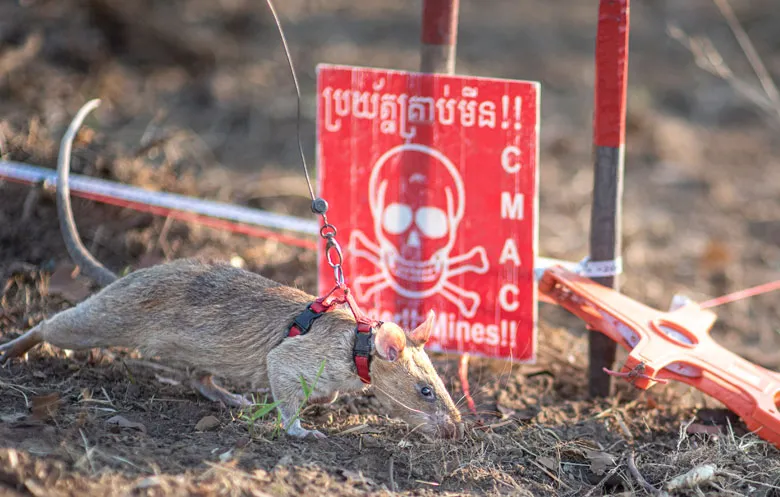Super-Sniffing Rat Sets a New World Record for Discovering Deadly Land Mines—and He's Just Getting Started
Super-Sniffing Rat Sets a New World Record for Discovering Deadly Land Mines—and He’s Just Getting Started
Ronin, a 5-year-old African giant pouched rat, has found 109 land mines and 15 other unexploded ordnances in Cambodia
Ronin the African giant pouched rat is one of more than 100 rats trained by a Belgian nonprofit to sniff out deadly land mines.
Guinness World Records / APOPO
Former conflict zones are littered with land mines, a type of controversial concealed weapon designed to kill or maim anyone who walks or drives over them.
For humans, finding these hidden explosives can be difficult and dangerous work. But for Ronin the rat, sniffing out land mines is a breeze. He recently set a new world record for the “most land mines detected by a rat”—and he’s just getting started. At 5 years old, Ronin will likely keep working for another two more years before he enjoys his well-deserved retirement.
Between August 2021 and February 2025, Ronin successfully located all of the mines—109 in total—in the commune of Sror Aem, Preah Vihear, Cambodia, according to Guinness World Records. He also found 15 other unexploded ordnances, such as mortars and grenades.
HeroRAT Ronin Breaks Guinness World Records® title
Watch on
Ronin is an African giant pouched rat (Cricetomys ansorgei) that works with APOPO, a Belgian nonprofit using rats and dogs to help solve some of the world’s biggest problems. In addition to finding land mines, the group’s highly trained animals can detect tuberculosis, locate earthquake survivors and sniff out smuggled wildlife parts like pangolin scales and elephant tusks.
The organization trains rats like Ronin—which it calls “HeroRATs”—to smell the chemical compounds found in land mines, while ignoring the odors of scrap metal. After humans equipped with metal detectors clear “safe lanes” on the ground, the rats methodically sniff the areas surrounding the safe lanes until they detect the aroma they’ve been trained to recognize. Then, their human teammates take over, confirming and safely disposing of any detected land mines.
Handlers say Ronin loves to eat avocado, as well as bananas and peanuts.
APOPO
African giant pouched rats are among the world’s largest rats, weighing up to three pounds and measuring between two and three feet from nose to tail. But they’re still light enough to avoid triggering the land mines. They’re also speedy, capable of searching an area about the size of a tennis court in roughly 30 minutes, according to APOPO. It would take a human with a metal detector between one to four days to cover the same ground.
Born in Tanzania in August 2019, Ronin has earned a reputation for working hard, while also being friendly and relaxed. When he’s not sniffing out land mines in Cambodia’s Preah Vihear province, he loves to nosh on avocado.
He takes the crown from another APOPO rat, a male named Magawa who found 71 land mines and 38 pieces of unexploded ordnance over his nearly five-year career. Magawa, who assisted with clearing more than 2.4 million square feet of land, died in January 2022 at the age of 8.
Specially trained rats can detect the smells of chemical compounds found in land mines, while ignorning scrap metal.
APOPO
Ronin is one of more than 100 rats working with APOPO to suss out land mines. And these hard-working rodents are helping solve a major problem: An estimated 110 million land mines are still lurking in the ground in more than 60 countries around the globe. Cambodia alone, which endured decades of conflict, has between four and six million land mines, according to APOPO. The country has the highest number of mine-related amputees per capita in the world.
Over the years, these hidden dangers have killed or injured tens of thousands of people, and they still threaten civilians, including children. In 2023, land mines killed or wounded 5,757 individuals around the globe.Slowly but surely, APOPO and its team of skilled rodents are making a dent in the global land mine problem. Since 2000, the organization has cleared 169,713 land mines and other explosives in war-impacted countries like Cambodia, South Sudan, Turkey, Azerbaijan, Senegal and Ukraine.
“When we launched APOPO, the common view was that it would take around 500 years to clear all land mines from the Earth’s surface,” says Christophe Cox, APOPO’s chief executive officer, to CBS News’ Kerry Breen. “Twenty-five years later, there is light at the end of the tunnel, and if the international community fully supports the collaboration of all demining operators, we could clear the remaining minefields in our lifetime.”
Get the latest stories in your inbox every weekday.


